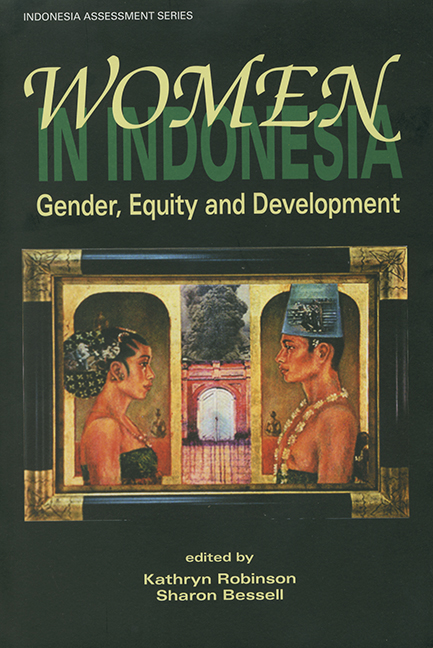Book contents
- Frontmatter
- Contents
- Tables
- Figures
- Contributors
- Acknowledgments
- Glossary
- Prologue
- 1 Introduction to the Issues
- 2 The Mega Factor in Indonesian Politics: A New President or a New Kind of Presidency?
- 3 The Downfall of President Abdurrahman Wahid: A Return to Authoritarianism?
- 4 The Year in Review: From Blind Man's Bluff to Mega Expectations
- 5 Further Comments on the Economy, with a Gender Perspective
- 6 Institution Building: An Effort to Improve Indonesian Women's Role and Status
- Commentary
- 7 Feminism in Indonesia in an International Context
- 8 Gay and Lesbi Subjectivities, National Belonging and the New Indonesia
- 9 And the Winner Is … Indonesian Women in Public Life
- 10 Indonesian Women Artists: Transcending Compliance
- 11 Literature, Mythology and Regime Change: Some Observations on Recent Indonesian Women's Writing
- 12 Women and the Labour Market during and after the Crisis
- 13 Women's International Labour Migration
- 14 Customary Institutions, Syariah Law and the Marginalisation of Indonesian Women
- 15 Women's Grassroots Movements in Indonesia: A Case Study of the PKK and Islamic Women's Organisations
- 16 Women's Activism against Violence in South Sulawesi
- 17 Gender Mainstreaming and Sex-disaggregated Data
- 18 The Changing Indonesian Household
- 19 Women, Family Planning and Decentralisation: New Variations on Old Themes
- 20 Men, Women and Community Development in East Nusa Tenggara
- References
- Index
- INDONESIA ASSESSMENT SERIES
1 - Introduction to the Issues
Published online by Cambridge University Press: 21 October 2015
- Frontmatter
- Contents
- Tables
- Figures
- Contributors
- Acknowledgments
- Glossary
- Prologue
- 1 Introduction to the Issues
- 2 The Mega Factor in Indonesian Politics: A New President or a New Kind of Presidency?
- 3 The Downfall of President Abdurrahman Wahid: A Return to Authoritarianism?
- 4 The Year in Review: From Blind Man's Bluff to Mega Expectations
- 5 Further Comments on the Economy, with a Gender Perspective
- 6 Institution Building: An Effort to Improve Indonesian Women's Role and Status
- Commentary
- 7 Feminism in Indonesia in an International Context
- 8 Gay and Lesbi Subjectivities, National Belonging and the New Indonesia
- 9 And the Winner Is … Indonesian Women in Public Life
- 10 Indonesian Women Artists: Transcending Compliance
- 11 Literature, Mythology and Regime Change: Some Observations on Recent Indonesian Women's Writing
- 12 Women and the Labour Market during and after the Crisis
- 13 Women's International Labour Migration
- 14 Customary Institutions, Syariah Law and the Marginalisation of Indonesian Women
- 15 Women's Grassroots Movements in Indonesia: A Case Study of the PKK and Islamic Women's Organisations
- 16 Women's Activism against Violence in South Sulawesi
- 17 Gender Mainstreaming and Sex-disaggregated Data
- 18 The Changing Indonesian Household
- 19 Women, Family Planning and Decentralisation: New Variations on Old Themes
- 20 Men, Women and Community Development in East Nusa Tenggara
- References
- Index
- INDONESIA ASSESSMENT SERIES
Summary
In 2001, Indonesia appointed its fifth president – a woman. The politicking surrounding the elevation of Megawati Sukarnoputri to high office brought issues of gender and politics into public focus. It was prescient that the 2001 Indonesia Update – the first of the new millennium – had been organised around the issue of gender equity in the transition to democracy in Indonesia.
This book, published, like its predecessors, as part of the Indonesia Assessment series, presents the papers from the Indonesia Update – an annual conference held by the Indonesia Project and the Department of Political and Social Change in the Research School of Pacific and Asian Studies at The Australian National University in Canberra. The Indonesia Update brings together scholars, civil servants, community activists and members of the general public who share a deep interest in political, economic and social developments in Indonesia, to hear an update on the state of politics and the economy, and a series of papers by experts on a chosen theme.
In the political update presented in Chapter 2, media analyst Krishna Sen analyses the elevation of Megawati to the presidency through the lens of Indonesia'a media (media freedom being one of the touchstones of democracy frequently invoked by Abdurrahman Wahid in defence of his presidency). In Sen's view, and in a manner not unfamiliar in feminist analyses of representations of women, the Indonesian media principally presented Megawati in terms of ‘lack’. She is uneducated, not an intellectual, and a woman. But Sen is optimistic about the future of Indonesian democracy, and outlines some provocative views of what the transition to the Sukarnoputri- Hamzah Haz team has meant: the locus of power appears to have shifted away from a previously entrenched political elite and has broadened beyond Java.
In his response to Sen's update (Chapter 3), Edward Aspinall looks at the events leading up to President Abdurrahman's forced departure from office, and questions whether the Megawati presidency marks a return to authoritarianism. He identifies some risk to further democratisation if political uncertainty and economic problems continue unabated.
In the economics update in Chapter 4, Mari Pangestu notes how far the Indonesian economy has rebounded since the ‘total crisis’ of 1998, but reminds us of the severe problems still confronting the nation.
- Type
- Chapter
- Information
- Women in IndonesiaGender, Equity and Development, pp. 1 - 12Publisher: ISEAS–Yusof Ishak InstitutePrint publication year: 2002



